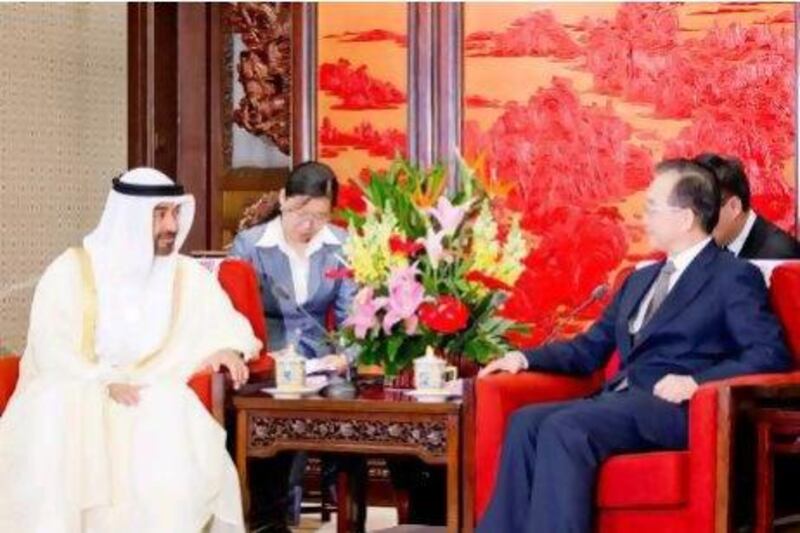BEIJING // The UAE and China have pledged to strengthen ties even further after an "extremely successful" three-day visit to Beijing by Sheikh Mohammed bin Zayed, Crown Prince of Abu Dhabi.
Sheikh Mohammed flew out of the Chinese capital yesterday evening after holding talks earlier in the day with the premier Wen Jiabao and the chief legislator Wu Bangguo.
"It was extremely successful," said Omar Al Bitar, the UAE Ambassador to China. "Both leaderships have agreed to move forward in every aspect - economically, culturally, educationally and in tourism.
"There is a very strong will. They are laying the foundations to create this kind of strategic partnership."
On Wednesday, Sheikh Mohammed reopened an Arabic teaching centre that had been refurbished with funds from his Court and renamed in honour of Sheikh Zayed, the founding President.
Sheikh Mohammed and Sheikh Abdullah bin Zayed, Minister of Foreign Affairs, held talks that afternoon with Xi Jinping, the Chinese vice president who is expected to become president next year.
The visit came two months after Mr Wen visited the UAE and the countries announced they would develop a "strategic partnership".
Mr Xi said Mr Wen's visit to the UAE in January, when the Chinese premier gave the keynote address at the World Future Energy Summit in Abu Dhabi, began a new stage in relations between the two countries.
Perhaps the biggest boost in relations since Sheikh Mohammed's last visit to Beijing, in August 2009, has been in tourism.
Last year 194,000 Chinese tourists visited Dubai, says the Beijing office of the Dubai Department of Tourism and Commerce Marketing.
That figure was more than double the total in 2008.
The increase partly stems from China granting the UAE "approved destination status" in 2009, making it easier for Chinese tourists to apply for visas and allowing tour companies to advertise trips to the Emirates.
Dubai hotels have responded to the influx by putting Chinese food on their menus and hiring Chinese-speaking staff.
Zhang Hanqin, a tourism analyst at Hong Kong Polytechnic University, said the growth in travel was partly because Chinese people now want to explore further afield.
"Why Dubai? It's partly because it represents a very different culture and probably people are going there not only for shopping, but for investment opportunities," Ms Zhang said.
In an indication of how relations are growing in cultural terms, this month a Confucius Institute, which teaches Mandarin, opened on Zayed University's campus in Khalifa City in Abu Dhabi.
The countries have also enjoyed heavy growth in trade, which increased on average by more than a third each year over the past decade to reach about US$35 billion (Dh128.5bn) last year.
Non-oil trade between Abu Dhabi and China increased from Dh1.32bn in the first half of 2010 to Dh2.16bn in the same period last year.
And Chinese banks, such as the Industrial and Commercial Bank of China, the world's largest bank by stock market value, have had their profits rapidly increase at their Middle East units in Dubai.
There are about 200,000 Chinese residents in the Emirates, many of whom are involved with the about 3,000 Chinese companies operating in the country.
Sheikh Mohammed arrived in Beijing from Seoul, where he had attended a nuclear-security summit and pledged $1m to upgrade International Atomic Energy Agency laboratories that track the origin of nuclear material.







